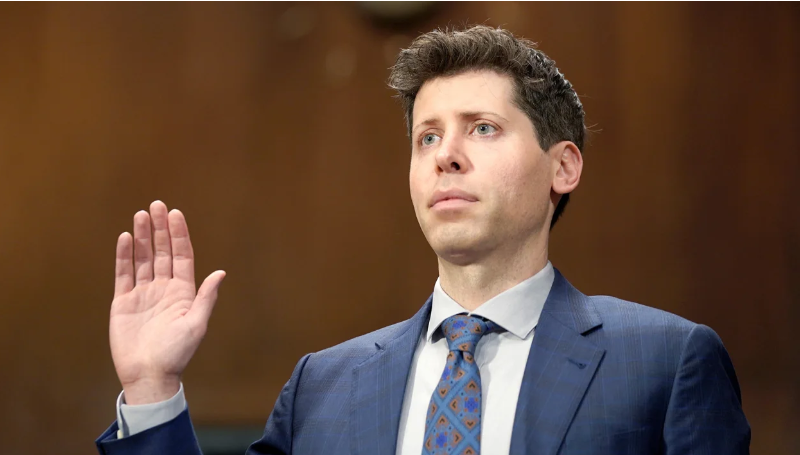Mr. ChatGPT Congress hears OpenAI CEO Sam Altman on AI threats. During a Senate panel hearing on Tuesday, OpenAI CEO Sam Altman asked lawmakers to regulate artificial intelligence, describing the present surge in the industry as a possible “printing press moment” but one that required protections.
In his opening statement before a Senate Judiciary panel, Altman said, “We think that regulatory intervention by governments will be critical to mitigating the risks of increasingly powerful models.”
Altman’s attendance is in response to the increased arms race over AI and heightened legislative concern over the threats presented by the technology, both triggered by the widespread popularity of ChatGPT, Altman’s company’s chatbot tool.
Read more: Ad sales have dropped, leading to Vice Media’s bankruptcy filing.
On Tuesday, Senator Richard Blumenthal opened the meeting by playing a recording of himself that was a phony. This was done to demonstrate the dangers of the technology. The recording stated that AI could not be allowed to develop in an unregulated environment and included both written remarks from ChatGPT and audio of Blumenthal’s voice produced using recordings of his actual floor speeches.
Blumenthal argued that while the views reflected by ChatGPT were accurate representations of the actual lawmakers, they could have just as quickly been “an endorsement of Ukraine’s surrendering or Vladimir Putin’s leadership.” In his words, that “would’ve been frightening.”
A rising number of tech businesses have released new artificial intelligence (AI) tools in recent months, and they have the potential to revolutionize the way we live, work, shop, and interact. Some of the top names in tech have spoken out about how these same tools can propagate disinformation, reinforce biases, and put millions of jobs at risk.
The use of AI to mislead voters and target disinformation is “my areas of greatest concern,” Altman said in a Tuesday speech, especially given that “we’re going to face an election next year, and these models are getting better.”
Altman suggested on Tuesday that the United States government may regulate the AI business by instituting a licensing framework for companies developing the most advanced AI systems. To “develop and release AI models above a threshold of capabilities,” Altman suggested this “combination of licensing and testing requirements.”
On Tuesday, IBM’s Vice President and Chief Privacy and Trust Officer Christina Montgomery and Gary Marcus, a former professor at New York University and self-described skeptic of AI “hype,” will also testify.
A new era of “move fast and break things,” the longtime ideology of Silicon Valley titans like Facebook, was something Montgomery cautioned about. “The era of AI cannot be another era moving fast and breaking things,'” Montgomery warned legislators. She continued, however, “We don’t have to slam the brakes on innovation either.”
Altman and Montgomery both agreed that AI had the potential to both destroy and generate new types of employment.
Jobs will be affected, Altman warned Blumenthal. We try to be explicit about this, and collaboration between business and government, but mostly government action, will be necessary to address this. But I have a lot of faith in the quality of future employment opportunities.
Regarding the new wave of AI products that can generate images and messages in response to user cues, arguably, no other figure has come to serve as a face more than Altman, CEO of OpenAI.
Altman’s comments follow a dinner the previous night with more than 60 members of the House of Representatives. Altman demonstrated numerous implementations of ChatGPT with “too much amusement,” according to an attendee, who also noted that legislators were “riveted” by the event.
The source said most of the audience agreed that artificial intelligence should be regulated.
Ro Khanna, a Democrat whose district in California encompasses Silicon Valley, said that during the meal, Altman emphasized that artificial intelligence is a tool, not a “creature,” and that it “can help with tasks, not jobs.”
“Altman’s most helpful contribution was dialing down the hype,” Khanna told CNN.
As part of the White House’s attempts to highlight the significance of ethical and responsible AI development, Vice President Kamala Harris and, briefly, President Joe Biden met with numerous tech CEOs earlier this month, including Altman.
Altman has portrayed himself as “a little bit scared” of artificial intelligence in interviews this year. He claims that going ahead, his company will act ethically.
Altman and OpenAI should proceed with more caution. A group of prominent tech executives, academics, and researchers, including OpenAI co-founder Elon Musk, have written an open letter urging artificial intelligence research facilities like OpenAI to halt the training of their most advanced AI systems for at least six months due to “profound risks to society and humanity.”
Some of the letter’s points were echoed by Altman, who acknowledged as much. At a meeting earlier this month, Altman stressed the importance of “moving with caution and an increasing rigor for safety issues.” A letter was not the best approach.









